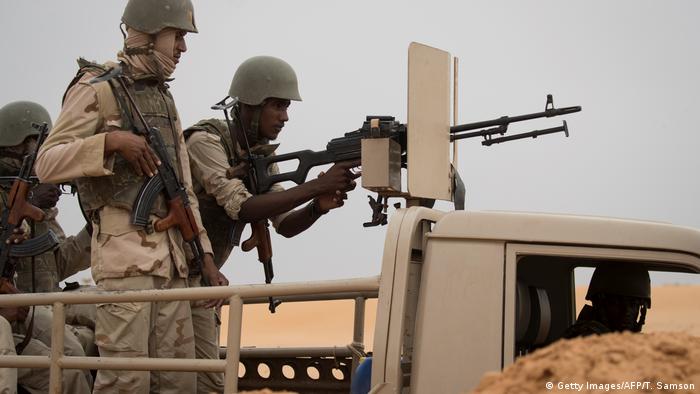The security situation in the Sahel is deteriorating. The European Union is supporting the Region financially and militarily. In the long term, States should establish a protection force. But that will take time.

Soldiers of the G5-use of force in Mauritania on the border with Mali
The walls are still bare in the elongated space, at the end of Jean-Marc Gravellini sits, his True echoes a little when he speaks. The new coordination office of the Sahel Alliance, on the outskirts of the EU quarter in Brussels has just opened in the middle of may and there is still much to do. Not only in terms of the establishment of the office.
Gravellini is the coordinator of the Sahel Alliance, which was founded in 2017 by Germany, France and the European Union. Shortly thereafter, the world Bank, the African development Bank and the United Nations development programme (UNDP) joined, in the meantime, some other EU countries are on Board.
Initiated the project, German Chancellor Angela Merkel and French President Emmanuel Macron. It’s supposed to be, among other things, a response to the deteriorating security situation in the Sahel Region. In Mali, for example, militant Islamists have established after the French military intervention in 2013, its stops you from practicing more and more also in the previously more peaceful neighboring countries of Burkina Faso and Niger.
Gravellini want to ensure from Brussels that the coordination of development cooperation work better “in a more efficient and faster” progress: “It is often said that you can not win the war against terrorism, if we win the war of development,” he says. This is the most difficult task. The second challenge: How the project can be implemented in very dangerous areas, especially in the border areas. Just there, where the population suffers the most. Gravellinis answer: less bureaucratic approach, without a lot of applications. And: more collaboration with NGOs and the civil society on the ground.
The Sahel Region as a “strategic priority”
The EU has said the situation in the Sahel Zone from 2014 to 2020, eight billion euros in development aid and referred to the Region as a “strategic priority”. Especially noticeable in the middle of may, was spread over several days, the Foreign, defence and development Ministers of the EU States in Brussels on this subject among themselves, exchanged on one of the days with their Counterparts from the Sahel Region, from Mali, Burkina Faso, Niger, Mauritania and Chad.

The Foreign and defence Ministers of the EU States and the G5-Sahel States in Brussels
At the Meeting was the establishment of the G5 Sahel-force, a task force of five African countries, to provide in 2014 for more security in the Region. The foreign policy chief of the EU, Federica Mogherini, said in Brussels is very vague, the exchange with the G5 Ministers had been “very good”, “very honest and constructive”. They wanted to promote cooperation. The you namely, for the security and stability of Europe is essential.
This is precisely Mogherini describes the main reason why the EU is involved since few years in the Sahel Zone. “The Sahel Region is very close to Europe,” said Pierre Vimont, from the Brussels think tank Carnegie Europe. In addition to radical militias are also human beings, drugs and arms trafficking, as well as a bad economic situation are crucial for the Region and for the EU had become a “significant concern”.
Games for the European Union, of course, the theme of Migration a prominent role, says the Frenchman, Vimont. The EU would like to prevent people from the Sahel made their way to Europe.
A measure is to provide support to the Sahel States military. Federica Mogherini, according to 147 million euros from the EU for the construction of the 5000 soldiers comprehensive G5-force flowed. A year ago, the European Union and other States had said, a total of 414 million euros.
On long-term goals
So far, mainly French troops, but also soldiers from other EU countries and the UN forces in the Region. In the long term, the European Union hopes, however, that the G5 takes over task force, so that the international forces can pull it off.

The external Commissioner of the EU Federica Mogherini in front of the flags of the Sahel countries at a Meeting in Brussels
But: “This is going to take his time,” says the Diplomat Vimont. “You have to train these troops in the first place and then help to coordinate each other.” According to information from the German press Agency that is not currently the case. On the side of the G5 countries, there are serious deficits in communication. The participating African States criticized that some States, your promise would not be fulfilled in terms of funding. This was according to information from the EU, but to countries such as Saudi Arabia and the United Arab Emirates – and non-EU States.
It will take several years for the armed forces in the Region fully operational, says Vimont to do so. To really get to the “root of problems”, had to be created, the cooperation between the EU and the Sahel in the long term. This is the most Difficult. The EU could support this, for example, by improving the prices of raw materials, the export, the countries or the Expansion of power networks to drive forward. But, Vimont: “The European countries want natural quick results.”